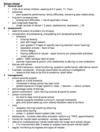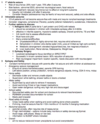Long case issues Flashcards
(86 cards)
1
Q
A

2
Q
Aboriginal health
A

3
Q
ADHD
A

4
Q
AED interaction
A

5
Q
AED
side effects
A

6
Q
Ashworth scale
A

7
Q
Aspiration
A

8
Q
Attachment
A

9
Q
Behavioural management
A

10
Q
Body image
A

11
Q
Bone issues
A

12
Q
Bullying
A

13
Q
Carer support
A

14
Q
Cerebral Palsy
A

15
Q
CF management
A

16
Q
CHD complications
A

17
Q
Chronic illness
A

18
Q
Communication
A

19
Q
Complementary medications
A

20
Q
Compliance
A

21
Q
Compliance issues in adolescence
A
- Establish agreed agenda for consultation
- Establish main difficulties: show respect and empathy
- Say positive thing
- Outline problem: don’t assume patient knowns everything they need to about their condition
- Outline health issues if no change: be honest
- Action plan before next clinic: define roles in management of condition for patient and parents, short term goals
- Extra support: ask they how they would like help
Consider psychological co-morbidities
Think how an MDT might help
22
Q
Complications CF
A

23
Q
Confidentiality
A

24
Q
Consent
A

25
Constipation

26
Delayed puberty

27
Developmental delay

28
Developmental Delay

29
Drooling

30
Drugs affecting bone health

31
Early intervention

32
Emergency care plan

33
End of life care
Early involvement of palliative care

34
Failure to thrive
**Definition:** dropped\> 2 centiles
**Management**
* growth curve: monitor growth and growth velocity
* family history
* dietary diary
* in/out balance
* exclude pathological causes: FBC, EUC, LFTs, TFTs, micronutrients, coeliac screen, CF, stool tests, urine culture, metabolic test, endoscopy
* depend on severity: admission for dietary diary
**Differential**
_Decreased intake_
* fussy eating/oral aversion/behavioural issues (sensory)
_Increased expendicture/output_
* diarrhoea, chronic disease
_Decreased absorption_
* coeliac, IBD

35
Financial support

36
Fussy eating

37
Genetic counselling

38
HEADSS

39
Hearing loss

40
Hospitalisation

41
Hospitalisation

42
Immunisation

43
Immunosuppresants

44
Immunosuppression

45
Menstruation in the disabled

46
NDIS

47
Needle phobia

48
Nocturnal enuresis

49
Nutrition

50
Obesity

51
Oral aversion
**Education:**
* inform parents long term
**Management**
* introduce foods as early as possible
* family mealtimes
* fun and encourage to explore texture food
* graded exposure
* no force feeds
* reduce iatrogenic equipment
* dental health
* monitor nutrition
**Support**
* SP, dietician, feeding clinic

52
Orthopaedic issues CP

53
OSA

54
Pain

55
Pain in disabled

56
Parenteral nutrition

57
Prematurity
acute

58
Prematurity
chronic

59
Refeeding

60
Relationship boundaries

61
Relationship boundaries

62
Respite services

63
Resuscitation status

64
Rural issues

65
School for special needs

66
School refusal

67
Screening CP

68
Seizures

69
Sibling issues

70
Sleep initiation

71
Smoking

72
Social burden

73
Social burden

74
Spasticity

75
Spasticity

76
Steroid side effects

77
Stoma care

78
Substance abuse

79
Tracheostomy

80
Tracheostomy
indications

81
Tracheostomy

82
Transition of care
**Trapeze/transition support service:**
* compliance issues
* unplanned admissions
* indigenous
* cultural
* complex background coordination
* 14-25 years
**MDT meeting**
* discuss management

83
UTIs

84
Weight in CP

85
Withdrawal of AED

86
Financial support



